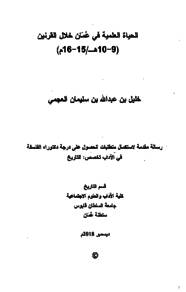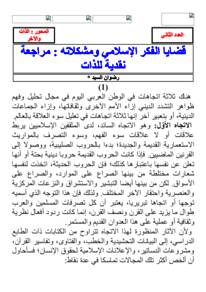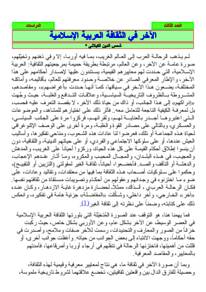Document
الحياة العلمية في عمان خلال القرنين 9-10 هـ - 15-16 م
Publisher
جامعة السلطان قابوس
Gregorian
2018
Language
Arabic
Subject
English abstract
This thesis aims at revealing the nature of scientific life in Oman during the 9th and 10th centuries through focusing on the nature of this life in all its dimensions, the role of scientists in reviving the Imamate system, and their position on some of the political, Duration of thesis.
The researcher followed the inductive method in dealing with the sources of jurisprudence for the scholars of that stage, whether written or printed, in order to develop the historical facts and to deduce the role of scientists, especially in aspects related to the reality of people's lives. The researcher also followed the analytical approach in analyzing information from sources and documents which belong to the stage of study, whether correspondence between scientists and imams or among the scientists themselves, or (fatwas) of scholars to other scientists or the public.
The study was divided into an introduction, a preface, four chapters and a conclusion. The first chapter dealt with the factors and aspects that influence the scientific life, explained the role of both families and scientific centers, and encouraged science by scholars, imams and some sultans of the Prophet. The second chapter focuses on the scientific production and codification of scientists. The fourth and last chapter deals with the role of scientists in society in political, social and economic terms,
The study reached a number of results, most notably: the success of scientists in reviving the fifth Imamate in the beginning of the 9th century AH / 15 AD, and their contribution in enriching the scientific movement in the country, benefiting from several factors such as the emergence of scientific families and the attention received by the attention of some sultans of the Prophet, And the importance of copying books. The study also highlighted the diversity of educational institutions and the multiplicity of its methodology, the contributions of some scientists in linguistic and literary sciences, and mental sciences such as medicine, pharmacy and sea science.
The study also concluded that the Imamate system had an organizational structure headed by the imam and his advisors, And some of them called them the owner of the state or the owner of the sword, and some call them the title of "the state of the mighty," and some of them, In contrast, the jurisprudential books mentioned that the scholars had a political entity called the "State of the Imam" and they directed them to spend expenses and entitlements to the state, In addition to their role as reformist scientists in the society by carrying out important social, economic and political roles and were involved in solving various issues
Member of
Resource URL
Arabic abstract
تهدف هذه الأطروحة إلى الكشف عن طبيعة الحياة العلمية في عمان خلال القرنين 9-10هـ/15-16م من خلال التركيز على طبيعة تلك الحياة بمختلف أبعادها، ودور العلماء في إحياء نظام الإمامة، و موقفهم من بعض القضايا السياسية والاجتماعية والاقتصادية التي مرت بها عمان خلال مدة الأطروحة.
وقد اتبع الباحث المنهج الاستقرائي في التعامل مع المصادر الفقهية لعلماء تلك المرحلة سواء المخطوطة او المطبوعة، بغية استنباط الحقائق التاريخية، والاستدلال على الدور الذي قدمه العلماء لاسيما في الجوانب ذات الصلة بواقع حياة الناس، كما اتبع الباحث المنهج التحليلي في تحليل المعلومات من واقع المصادر والوثائق التي تعود إلى مرحلة الدراسة سواء كانت مراسلات بين العلماء والأئمة أو بين العلماء أنفسهم، او فتاوى العلماء لغيرهم من العلماء أو العامة.
وقسمت الدراسة إلى مقدمة وتمهيد واربعة فصول وخاتمة، تناول الفصل الأول العوامل والمظاهر المؤثرة في الحياة العلمية واوضحت دور كلا من الأسر والمراكز العلمية، والتشجيع على العلم من قبل العلماء والأئمة وبعض سلاطين النباهنة، وكذلك إسهام الوقف التعليمي والتواصل بين العلماء ونشاط حركة النسخ وخزائن المكتبات في ذلك، بينما خصص الفصل الثاني للحديث عن أماكن التعليم ونظامه الأولي والمتقدم، أما الفصل الثالث فركز على الإنتاج والتدوين العلمي للعلماء، أما الفصل الرابع والأخير فتناول دور العلماء في المجتمع من الناحية السياسية والاجتماعية والاقتصادية
وتوصلت الدراسة إلى عدد من النتائج أبرزها: نجاح العلماء في إحياء الإمامة الخامسة في مطلع القرن وه/15م، وإسهامهم في إثراء الحركة العلمية في البلد مستفيدين من عدة عوامل كظهور الأسر العلمية و ما حظي به العلم من اهتمام من قبل بعض سلاطين النباهنة، والأمراء، واهمية نسخ الكتب، كما أبرزت الدراسة تنوع المؤسسات التعليمية وتعدد منهجيتها، وإسهامات بعض العلماء في العلوم اللغوية والأدبية، والعلوم العقلية كالطب والصيدلة وعلم البحر، كما توصلت الدراسة إلى أن نظام الإمامة كان له هيكل تنظيمي يترأسه الإمام، ومستشاريه من الفقهاء والعلماء الذين يتولون شؤون القضاء، بالإضافة إلى الولاة وكتاب العدل، كما أنها كشفت عن جملة من السلاطين من كان يقتر العلماء ويجالسهم، وكان العلماء ينعتوا بعض السلاطين بلقب السيد المعظم أو السلطان، وكان البعض من يدعوهم بصاحب الدولة أو ص احب السيف، ويطلق البعض عليهم لقب "دولة الجبار"، في المقابل ذكرت الكتب الفقهية أن العلماء كانوا يتمتعون بكيان سياسي يطلق عليه لفظ " دولة الإمام" وكانوا يوجهونهم لصرف النفقات والمستحقات لإعزاز الدولة. بالإضافة إلى دورهم العلماء الإصلاحي في المجتمع من خلال القيام بأدوار مهمة اجتماعية واقتصادية وسياسية وكانوا طرفا في حل قضاياه المختلفة.
وقد اتبع الباحث المنهج الاستقرائي في التعامل مع المصادر الفقهية لعلماء تلك المرحلة سواء المخطوطة او المطبوعة، بغية استنباط الحقائق التاريخية، والاستدلال على الدور الذي قدمه العلماء لاسيما في الجوانب ذات الصلة بواقع حياة الناس، كما اتبع الباحث المنهج التحليلي في تحليل المعلومات من واقع المصادر والوثائق التي تعود إلى مرحلة الدراسة سواء كانت مراسلات بين العلماء والأئمة أو بين العلماء أنفسهم، او فتاوى العلماء لغيرهم من العلماء أو العامة.
وقسمت الدراسة إلى مقدمة وتمهيد واربعة فصول وخاتمة، تناول الفصل الأول العوامل والمظاهر المؤثرة في الحياة العلمية واوضحت دور كلا من الأسر والمراكز العلمية، والتشجيع على العلم من قبل العلماء والأئمة وبعض سلاطين النباهنة، وكذلك إسهام الوقف التعليمي والتواصل بين العلماء ونشاط حركة النسخ وخزائن المكتبات في ذلك، بينما خصص الفصل الثاني للحديث عن أماكن التعليم ونظامه الأولي والمتقدم، أما الفصل الثالث فركز على الإنتاج والتدوين العلمي للعلماء، أما الفصل الرابع والأخير فتناول دور العلماء في المجتمع من الناحية السياسية والاجتماعية والاقتصادية
وتوصلت الدراسة إلى عدد من النتائج أبرزها: نجاح العلماء في إحياء الإمامة الخامسة في مطلع القرن وه/15م، وإسهامهم في إثراء الحركة العلمية في البلد مستفيدين من عدة عوامل كظهور الأسر العلمية و ما حظي به العلم من اهتمام من قبل بعض سلاطين النباهنة، والأمراء، واهمية نسخ الكتب، كما أبرزت الدراسة تنوع المؤسسات التعليمية وتعدد منهجيتها، وإسهامات بعض العلماء في العلوم اللغوية والأدبية، والعلوم العقلية كالطب والصيدلة وعلم البحر، كما توصلت الدراسة إلى أن نظام الإمامة كان له هيكل تنظيمي يترأسه الإمام، ومستشاريه من الفقهاء والعلماء الذين يتولون شؤون القضاء، بالإضافة إلى الولاة وكتاب العدل، كما أنها كشفت عن جملة من السلاطين من كان يقتر العلماء ويجالسهم، وكان العلماء ينعتوا بعض السلاطين بلقب السيد المعظم أو السلطان، وكان البعض من يدعوهم بصاحب الدولة أو ص احب السيف، ويطلق البعض عليهم لقب "دولة الجبار"، في المقابل ذكرت الكتب الفقهية أن العلماء كانوا يتمتعون بكيان سياسي يطلق عليه لفظ " دولة الإمام" وكانوا يوجهونهم لصرف النفقات والمستحقات لإعزاز الدولة. بالإضافة إلى دورهم العلماء الإصلاحي في المجتمع من خلال القيام بأدوار مهمة اجتماعية واقتصادية وسياسية وكانوا طرفا في حل قضاياه المختلفة.
Category
Theses and Dissertations



